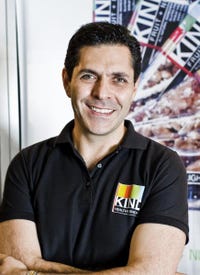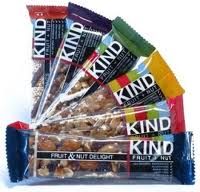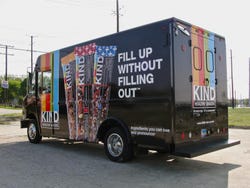KIND's Daniel Lubetzky wants to inspire you to be kindKIND's Daniel Lubetzky wants to inspire you to be kind
Entrepreneur Magazine's Entrepreneur of 2010 is building a fast-growing natural products business through his mission to be kind to your body, to your taste buds and to the world. Here's what Lubetzky thinks you can learn from KIND's vision and success.

Spend a few minutes talking to Daniel Lubetzky about his company KIND Healthy Snacks and it becomes clear very quickly that this guy is passionate about food, passionate about his employees and passionate about connecting people through kindness. The founder of KIND and its predecessor PeaceWorks, which was created in 1994 to foster trade and cooperation between Israelis and Palestinians, is also frequently celebrated for his business acumen. Last year, Entrepreneur Magazine named Lubetzky its Entrepreneur of 2010.
In honoring Lubetzky, the magazine cited Lubetzky’s work to “capture customers with his scrumptious snack bars and his mission to inspire random acts of kindness among strangers.” Lubetzky and KIND are taking this mission to a whole new level with its new “Do the KIND Thing” campaign, which launched earlier this year. The campaign encourages people to take part in monthly KIND challenges that are designed to pass on unexpected acts of kindness—such as giving a warm beverage to a person who help others in his or her community. If enough people sign up to complete each monthly KINDING Mission, the New York-based company will reciprocate with its own act of community generosity.
For the April KINDING Mission, KIND is challenging its community to give a flower to someone who helps keep the planet clean and green. If enough people sign up to do it, KIND will host beach, park and street cleanups across the country in honor of Earth Day.
To support the campaign, Lubetzky is sending a KIND Food Truck to tour the United States throughout the year, recruiting new people to join his company’s movement and to pass out free samples of KIND bars. KIND also plans to contribute more than $1 million dollars towards spreading kindness in 2011.
New Hope recently spoke with Lubetzky to talk about the reasoning behind Do the KIND Thing, what sets KIND apart from other nutrition bar companies and how budding food entrepreneurs can learn from his company’s success.
Why is KIND Healthy Snacks investing in this Do the KIND Thing campaign?
Daniel Lubetzky: We are always trying to make small contributions toward making the world a better place by inspiring unexpected acts of kindness. Each month we will ask our KINDaholics to do more and more, and we hope to keep growing the KIND movement until it totally sweeps the nation and motivates people to connect with those fellow human beings that they might take for granted or normally not connect with.
We really are trying to build a new kind of company and increase the number of people who are connected to our brand in meaningful ways. We want to be more than brand. We want to be a movement that reflects our customers’ lifestyles.
Using business and food to connect people
Why did you start KIND Healthy Snacks?
DL: Right after college and law school, I had this theory of using business as a force for bringing together communities in conflict regions. The first company that I started—of which KIND is an offshoot—is called PeaceWorks. It still exists. We make a line called Meditalia, which includes Mediterranean spreads and tapenades that are vegan and all natural. I got into the food industry because of my passion for using business and food as conduits for connecting people together. Along the way, we developed some expertise in the natural foods industry, and every time I traveled I would get very frustrated that I couldn’t find healthy snacks on the road. My only options were foods that tasted like cardboard or foods that were too indulgent and not wholesome. I was trying to come up with a snack that would fit with what I was looking for and that is what inspired me to create KIND. I wanted to come up with a healthy, wholesome snack that was also convenient to carry and did not sacrifice taste. 
What sets KIND bars apart from the many other nutrition bars on the market?
DL: This is a very crowded market because it also has a lot of different consumers that are put inside the space. We tap a very different type of consumer from the one that energy bars or performance bars tap. When the nutrition industry bar started, many of the products were driven by athletes and people doing endurance sports. But now the industry has evolved. We fit in the healthy snacking segment of the nutritional bar category. We appeal to athletes, but we also appeal to people who are looking for a healthy snack on the go. One major difference about us is that we taste delicious. For us, performance doesn’t trump taste or wholesomeness.
As far as the consumer is concerned, our products contain ingredients that you can see and pronounce. You can recognize what is inside a KIND bar without even opening the package. Most products in the nutritional bar category are what are called slab bars. They are called slab bars because the manufacturer takes a bunch of ingredients and creates an emulsion or paste that is used to make the bar. With slab bars, you can no longer recognize what you are eating. It’s just a mass. We are trying to do the exact opposite at KIND. We are trying to preserve the nature of the ingredient in its natural form; so our bars contain whole almonds and cashews and whole chunks of fruit. When you eat our bars, you know exactly what you are eating. Also, there is some magic in how we combine the fruits, nuts and honey so that the whole is greater than the sum of the individual parts.
What do you mean by that?
DL: When you take a bite, you can taste the individual tones of the different ingredients; and yet, the whole thing together just tastes really right. It is actually deceptively simple, because it seems like all you need to do is add honey, nuts and fruit, and what is the big deal? But really, it is very hard to treat the nuts and other raw materials with the care and respect that they need so that they can have a 15-month shelf life without using any artificial means but rather using only natural, proprietary processes that help us coat the nuts and fruit in the right way with the honey. We also have a clear, transparent packaging that itself relies on some proprietary secrets to achieve a product like this.
KIND finds a home in the natural product market
What distribution has KIND achieved thus far?
DL: We are sold throughout the United States, as well as in a few other countries. We got our start in the natural food industry, and it is still our core home. We are distributed in all of the large natural retailers, such as Whole Foods; and in all of the large regional chains, such as Henry’s and PCC Markets. We are also in all of the coops and independents. That is the heart of our business. On top of that, we are in specialty supermarkets and in the natural sets of the national chains, including Safeway and Kroger. We are also in Starbucks and other strategic accounts.
Are you looking to expand into Walmart or the other big box stores or to club stores such as Costco?
DL: We have been very strategic about our migration strategy, and we have rejected going too quickly into mass or club. We are taking it very, very slowly. First, we want to grow within our core market. Even within our core market, we are growing at 60 percent to 100 percent per year right now. So we still have huge room for growth. Part of the reason is that only about 25 percent of consumers eat traditional nutrition bars. This means that about 75 percent reject them, and the reason is because they think of these bars only as a performance-driven product. We are very different from that. Ours is a healthy snack and consumers choose it because it represents the most wholesome choice of many nutrition bars available to them. Also, we do not ask our customers to sacrifice taste or health. As a result, we are growing the healthy snack segment, which is the fastest growing segment of the nutritional bar category. This is because people are discovering that you can actually have a healthy snack that comes in the form of a bar and is very wholesome and very delicious.
Are you looking to expand the KIND brand beyond nutrition bars?
DL: Absolutely, but we have been very careful about it. We have a very big pipeline. We have hundreds of ideas, but we have three major projects that we are working on passionately. This year we will launch our first foray outside of bars. It will still be in the healthy snacking space, but it is not going to be bars. At this year’s Natural Products Expo West, we launched our six new flavors. These are performing like crazy. A few of them have already become our top sellers. At Natural Products Expo East, we will launch the new categories.
Which of your new flavors are performing the best?
DL: The Dark Chocolate Cherry Cashew, the Dark Chocolate Peanut Butter, the Apple Cinnamon Pecan, the Blueberry Pecan Plus Fiber and the Pomegranate Pistachio. They all have been really strong.
KIND key one: build the right team
You were named Entrepreneur Magazine’s Entrepreneur of 2010. Why do you think you earned this honor?
DL: I think honestly because they got really confused and didn’t know better [laughs]; but seriously, what makes KIND unique is our team. Our people are seriously extraordinary and each is better at what he or she does than I could ever dream of being. I started this company by myself in a studio apartment and then eventually moved to the basement of the building where I used to rent. I used to do every single aspect of my business. When we started exhibiting at Natural Products Expo, I used to set up the booth and sample the products. I used to go to the stores to sell and deliver the products myself. Just like many other new natural products entrepreneurs, I did every function: marketing, sales and operations. I had some role in manufacturing, but I didn’t do that on my own.
Sixteen years ago, we were doing everything wrong and we have slowly learned. It is very cool to have lived through every aspect of what you need to do to run a company like KIND and then to bring in people who are better at each of the roles than you were. Today, we have about 65 team members, and it is great learning from them, working with them and partnering with them. That is one key to our success.
KIND key two: assertive sampling
You mentioned learning a lot from your mistakes over the years. Is there a common mistake entrepreneurs in the natural, organic and healthy products market tend to make?
DL: I think there are many, but I will give you a big one—and that is not being assertive enough with your sampling. I understand why this happens. When you are starting from scratch, every resource is so scarce. I remember when I first started sampling at Natural Products Expo. I was very paranoid about spending too much money on samples. In the beginning, my sampling budget was quite small, and we would cut the bars into tiny pieces. We just couldn’t afford to give out free bars to everybody. This is such a huge mistake, because once you have a product that is your killer app or a best-in-class product, people will try it and they will love it. 
Of course, that is a big if. If you haven’t perfected the product, then don’t go wasting more money on sampling until you have. But if you have a product that you know whoever tries it, loves it and will come away as a fan, then you really need to get assertive with your sampling. Prior to me realizing this, our sampling budget was $800. That was 2008. Then I found mentors who helped me see the light, and we completely changed gears on sampling. In 2009, we started with an $800,000 sampling budget. This made all the difference, because we have a 98 percent conversion rate. This means that for every person who tries a KIND bar, 98 percent will buy it again. Many will recommend it to their friends. So it is obvious that we should be letting more people sample it.
Any other advice for the young companies in the natural products industry?
DL: Invest in your brand. In the beginning, again because I had this scarcity mentality, I didn’t spend enough on marketing. Part of investing in your brand, is putting your best foot forward at the tradeshows and investing in your booth. It doesn’t have to be big, but it does have to be attractive and look really, really professional. That goes across every aspect of your marketing. It took me so many years to learn that investing in your brand is the right investment. I also learned that you have to be very consistent. When you’re a small company, you don’t want to waste money so you might sacrifice on things like pantone colors because you think it looks good enough. In truth, it doesn’t look good enough. You have to be consistent with your look and feel so that when people see your logo, they really connect with it.
The other piece that I feel is very important is to be yourself, be authentic, be consistent and don’t try to be something you are not. Lots of brands through gimmicks are trying to follow a fad, and I don’t think that is sustainable. You really need to look internally and define the core values of your brand and then just really be true to those values and consistent in everything you do across all platforms.
Our mission is to be kind to your body, to your taste buds and to the world. This means that we would not introduce a product that is not healthy even if it is phenomenally tasty. We also wouldn’t launch a healthy product that is not delicious. Whatever your mission is, you cannot cut corners just to try to grow faster. Consumers need to know that they can rely on you for whatever you are communicating that you are.
About the Author
You May Also Like





